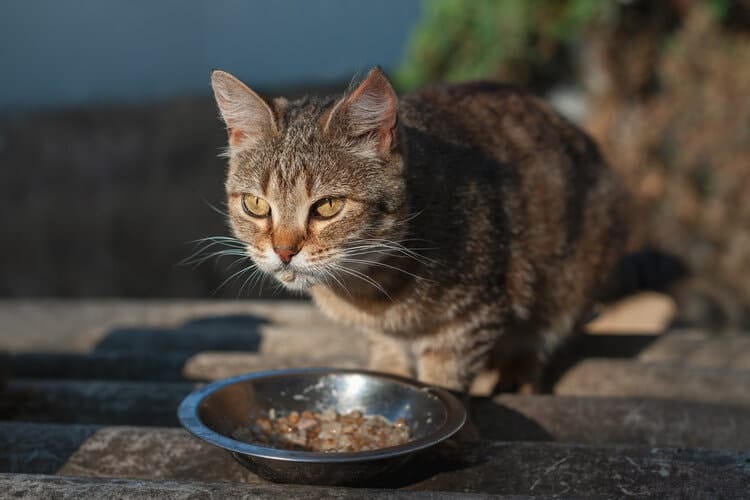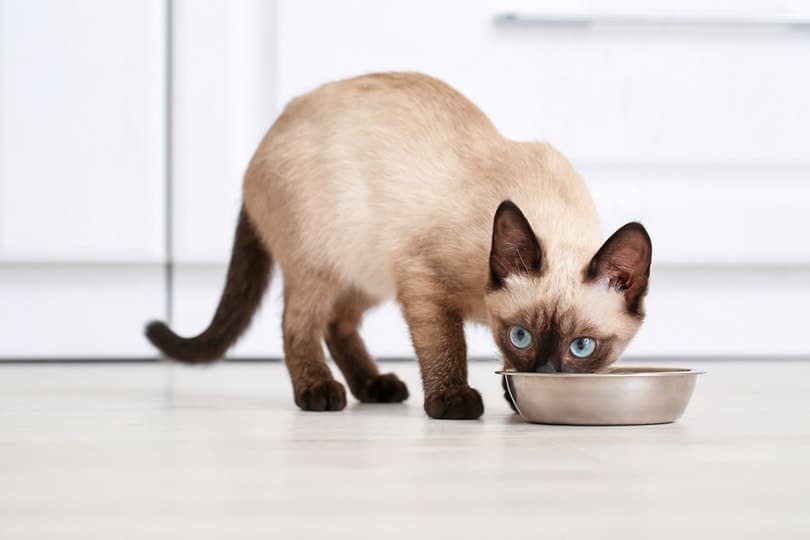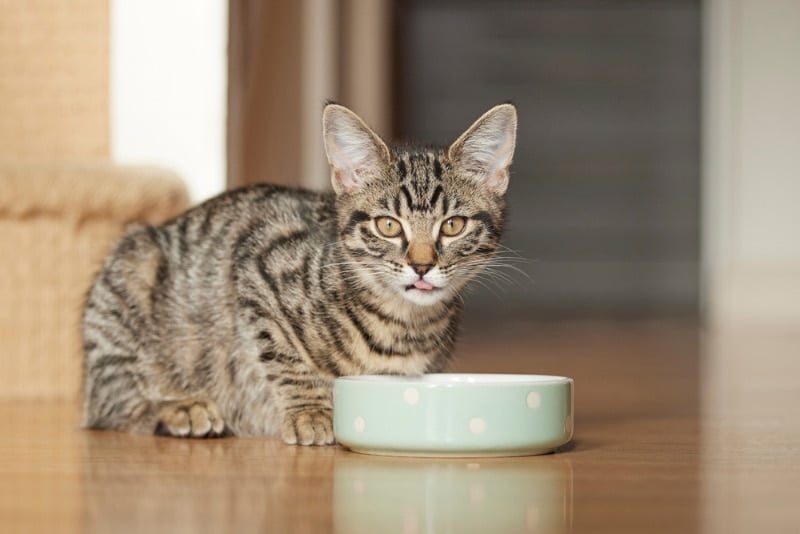If your cat has recently been diagnosed with chronic kidney disease or kidney failure, you might be thinking of ways to improve your little furry one’s quality of life. The kidneys’ primary function is to remove waste from the blood, manage blood pressure, produce necessary hormones, and stimulate the creation of new blood cells. If untreated for a prolonged period of time, kidney disease can lead to a series of health problems. That is why regular vet appointments are crucial as your kitty ages.

The 5 Homemade Cat Food Recipes for Cats with Kidney Disease
1. Our Favorite Recipe for Cats With Kidney Disease
Beef & Rice Homemade Cat Food
If you need a limited-ingredient recipe for your cat with kidney disease, this is our favorite! It’s low-sodium, inexpensive to make, and tasty for your favorite kitty. Plus, you can easily make a big batch and store individual portions in the freezer.
- Large saucepan
- Rice cooker or medium pot
- Spoon
- Storage containers
- 1 lb minced beef
- 1 cup white rice (slightly overcooked)
- 4 oz liver (chopped)
- 1 tsp vegetable oil
- Mineral and salt substitutes (as directed by your veterinarian)
- Heat the vegetable oil in a large saucepan over medium heat.
- Add the minced beef and liver to the pan. Cook the meat thoroughly, stirring often.
- Cook the rice until it’s a little bit mushy. This will make it easier for your cat to digest.
- Let the meat and rice cool completely.
- In a large bowl, combine your meat, rice, and mineral and salt substitutes. Stir until the food is evenly mixed.
- Divide the cat food into even portions. Store your leftovers in the freezer.
Image Credit: Chendongshan, Shutterstock
2. Special Senior Cat Diet for Kidney & Diabetes

This recipe has limited ingredients which is a great incentive when it comes to preparing your cat’s food.
- 2 tablespoons cooked green beans, finely minced
- 2 teaspoons finely minced carrots (if you substitute other vegetables, avoid starchy ones)
- 2 eggs
- 2 tablespoons baked chicken breasts, minced (no skin)
- 2⁄3 cup cooked and cooled white rice
- 1 tablespoon of olive oil
- Mineral and salt substitutes, as directed by your veterinarian
- ½ teaspoon of fish oil
INSTRUCTIONS
Mix all of the ingredients thoroughly. Cook in a pre-heated skillet over low heat, constantly stirring until the egg is soft but cooked. Let it cool down, and divide it into portions inside air-tight containers. Use the refrigerated portions within 36 hours. You can also freeze the portions. Mix in the fish oil supplement just before serving for added flavor and benefits.
3. Beef & Salmon Kidney Care Cat Food Recipe
This recipe includes an array of meats that any feline will surely enjoy; many are organs. These are great ingredient options for replicating what a feline would consume in the wild, and they’re beneficial for cats without kidney disease.
4. Chicken & Rice Kidney Disease Cat Food

In addition to a few human-grade ingredients, this recipe also calls for a few essential vitamins. You might be surprised to learn that cat vitamins and minerals are easy to source but should be vet-approved or recommended before they are incorporated into your cat’s diet. There is also a second recipe on this blog for cats on a restricted mineral or sodium diet, which would likely go hand in hand with a renal diet.
5. Multivitamins & Chicken Cat Food Recipe
This recipe includes an elaborate step-by-step guide paired with helpful pictures. The author has received vet approval for her recipe and has tweaked it over the years, so it’s perfect for her little kitty. We could recommend swapping the brown rice for white rice if your cat is in stages 3 or 4 of IRIS, but this is a great recipe to bring to your next vet appointment to ensure your feline receives the same stamp of approval.

How to Improve Your Cats’ Quality of Life with Kidney Disease
Unfortunately, kidney disease has no cure, and all you can do for your cat is reduce the disease’s progression. This involves certain supplements, medical treatments, and specialized diets. The progression of the damage to the kidneys needs to be closely monitored by a veterinarian, and appropriate changes in the treatments and diets must be implemented.
One of the Main Things That Can Be Improved Upon Once Your Cat Has Been Diagnosed Is Their Diet
Dietary therapy is the single most beneficial treatment for cats with renal disease. A specialized renal diet helps increase the life expectancy of a cat suffering from chronic kidney disease.
As a general rule, patients suffering from kidney disease need a diet with high moisture, less protein, non-acidifying sodium and phosphate, and more potassium and vitamin B. However, it is not all that easy. The diets need to be highly palatable and calorie-rich since kidney disease causes a reduction in appetite.
Before Proceeding With Changes, You Need Your Vet’s Approval
You most certainly do not want to cause your pet more pain or do additional damage to their kidneys. Veterinarians use an IRIS (International Renal Interest Society) grading system to categorize the different stages of kidney damage. The diets and treatments for cats suffering from kidney disease must be adjusted to each stage. That is why you must get your cat checked by the veterinarian first and then have the vet review the diet.
Some possible supplements to add to these recipes, depending on your cat’s disease stage and specific needs, are calcium, vitamin B, L carnitine, Taurine, potassium, phosphorus binders, and slippery elm. Your cat’s veterinarian will help you develop a diet specific to your cat’s needs.
Many foods on the market are produced solely for cats with kidney disease, but they can be expensive and contain unnecessary ingredients or may not be adequate for your cat’s disease progression. So yes, it is possible to create your own renal diet for your cat, but you must get it approved and adequately supplemented by the vet!
It is important to remember that with new dietary restrictions comes the potential for food aversions, and it is crucial to make the change of diet gradual to your cat by introducing no more than 10-20% of the new diet every 1 or 2 days, mixed with the old diet until the cat gets used to the new diet. It’s also important to remember that the disease causes nausea and lack of appetite. Sometimes, this needs to be treated with vet-prescribed medicines, but in other cases, you must use your imagination to instigate your cat to eat. Tasty food and hand feeding can be of help.
If you want to learn how to make cat food for cats with kidney disease that’s nutritious and tasty, here are a few of our favorite renal diet cat food recipes. Remember always to get them preapproved for your cat by the veterinarian.

Final Thoughts
Preparing your cat food will be a commitment, but when it comes to the health of their pets, most owners are in it for the long haul! We hope you enjoyed learning how to make cat food for cats with kidney disease and have found a recipe you and your kitty enjoy; feel free to adjust them according to your veterinarian’s recommendation.
Looking for more great recipes for your feline? Check these out!
Feature Image Credit: Daisy Daisy, Shutterstock
- 1 The 5 Homemade Cat Food Recipes for Cats with Kidney Disease
- 2 Beef & Rice Homemade Cat Food
- 3 How to Improve Your Cats’ Quality of Life with Kidney Disease
- 4 One of the Main Things That Can Be Improved Upon Once Your Cat Has Been Diagnosed Is Their Diet
- 5 Before Proceeding With Changes, You Need Your Vet’s Approval
- 6 Final Thoughts






